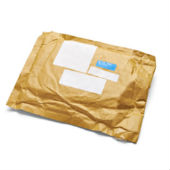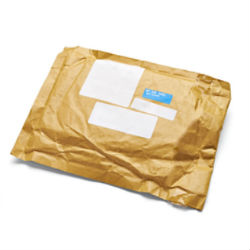
Now, after purchasing 10 ecstasy tablets and a bogus Hungarian passport scan (among other things), that Darknet-surfing robot’s shopping has been confiscated.
The London-based Swiss artists !Mediengruppe Bitnik – Domagoj Smoljo and Carmen Weisskopf – behind the project said on their blog that on 12 January, the day after the exhibition in Switzerland closed, the public prosecutor’s office of St. Gallen seized and sealed their work with the purpose of “[impeding] an endangerment of third parties through the drugs exhibited by destroying them.”
The artists describe their medium as the use of hacking as an artistic strategy and say that they programmed The Random Darknet Shopper in order to probe these questions:
What does it mean for a society, when there are robots which act autonomously? Who is liable, when a robot breaks the law on its own initiative?
In fact, the artists had already answered the question of who’s liable in an interview with The Guardian:
We are the legal owner of the drugs - we are responsible for everything the bot does, as we executed the code. But our lawyer and the Swiss constitution says art in the public interest is allowed to be free.
In short, the buck stops here, with the robot’s programmers, who believe their freedom of expression rights will protect them.
Hmm. Will they? That’s up to Swiss prosecutors, at this point.
In the meantime, authorities seized quite the laundry list of contraband randomly selected by the shopper bot.
The artists displayed the weekly purchases in a gallery, the Kunst Halle St. Gallen.
As you can see on the artists’ project page, besides the bogus passport and the ecstasy, the bot’s random purchases included:
- Counterfeit Diesel jeans
- A Sprite stash can that you can hide drugs or cash in
- A decoy letter (good for checking if your roommates or parents are scrutinizing or opening your mail)
- A baseball cap with a hidden, remote-control, mini video camera
- A platinum Visa card
- A dodgy carton of Chesterfield cigarettes from Moldavia
- A set of master fire brigade keys: “Useful for the tool box for unlocking and gaining access to communal gates and storage areas.”
Did we learn anything from the art project?
We already know that the Dark Internet – also known as the Darknet – is where computers are found that cannot be reached via the internet.
The Deep Web strata of the internet contains subsurface web content that’s not indexed by standard search engines, and the Darknet is a distributed filesharing network that makes up a smaller part of the sub-strata.
It’s certainly the place to go shopping for contraband, but also for far worse, given that it’s considered a haven for thieves, those who traffic in child abuse images, human traffickers, assassins, and peddlers of state secrets.
One of the lessons that Smojlo and Weiskopff contribute is that the trust levels between anonymous purchasers and sellers is quite high. In fact, their robot wasn’t ripped off once during 12 transactions, they told The Guardian.
From Smojlo:
The markets copied procedures from Amazon and eBay – their rating and feedback system is so interesting. With such simple tools you can gain trust. The service level was impressive – we had 12 items and everything arrived.
Weiskopff added:
There has been no scam, no rip-off, nothing. One guy could not deliver a handbag the bot ordered, but he then returned the bitcoins to us.
Honor among thieves, indeed. And among counterfeiters and drug sellers, to boot!
Image of package delivery courtesy of Shutterstock.

